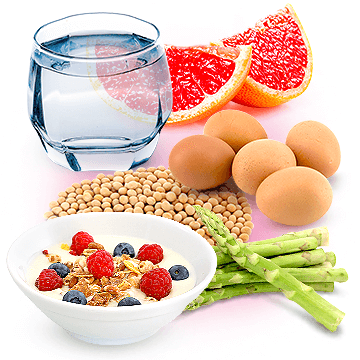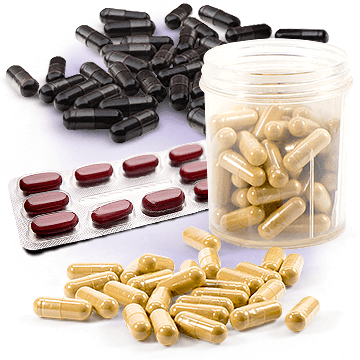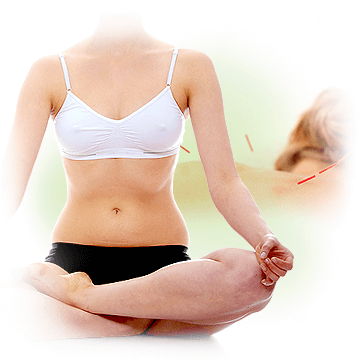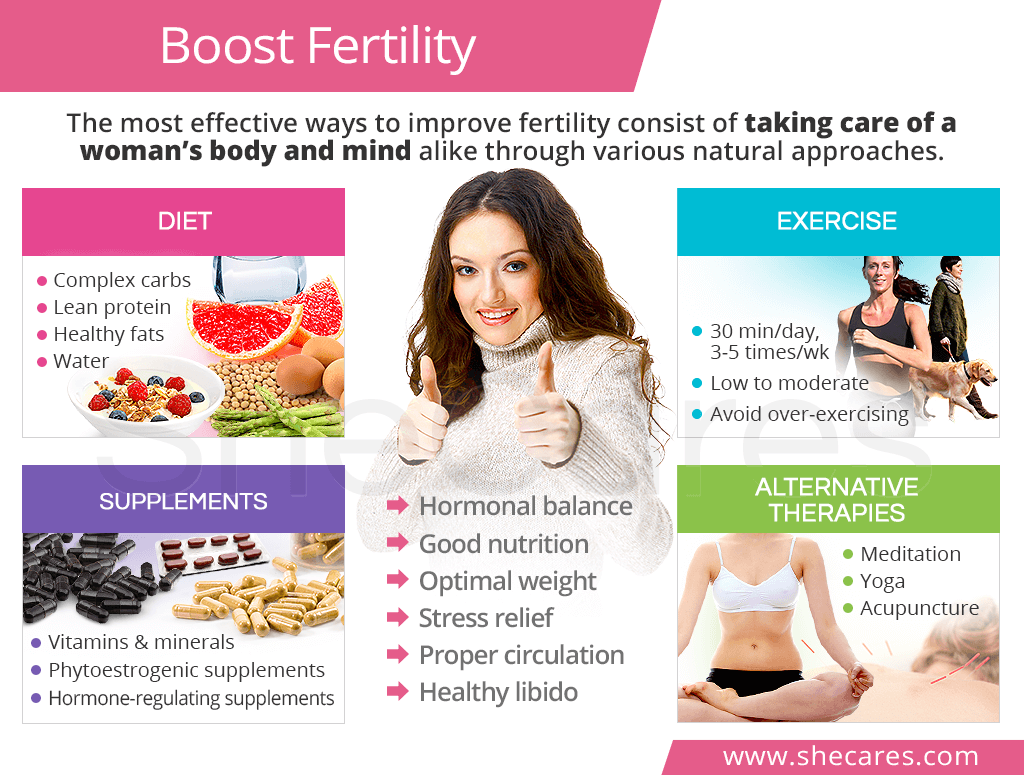Diet to Improve Fertility

Learning how to build one's diet is one of the best ways to increase fertility. A balanced and nutritious meal plan can also help a woman prepare her body for the demands of pregnancy.
Benefits of Fertility Diet
Proper nutrition can ensure hormonal balance and regular menstruation, both of which can make a woman more fertile.
Optimal weight is necessary for maintaining normal ovulatory cycles as obesity is one of the main risk factors for ovulation problems.
Good eating habits developed before conceiving can go a long way for a healthy pregnancy and postpartum.
Foods that Boost Fertility
A fertility diet is all about balance and smart food choices. A woman is encouraged to build her meals with the following three macronutrients that are rich in essential pre-pregnancy vitamins and minerals:
Complex carbohydrates should constitute 45-65% of daily calorie intake. They include whole grains, fruits, and vegetables.
Lean protein should constitute 10-35 % of daily calories. Plant-based protein, like beans, nuts, or seeds, along with low-mercury fish and eggs should be favored over meat.
Healthy fats, making up 20-35% of daily calories, can include mono- and polyunsaturated fats, like avocados, nuts, seeds, and fish.
Plenty of water
Foods that Might Decrease Fertility
Studies have shown that a diet rich in the following foods can increase the risk of ovulatory disruption and restrict blood flow to the reproductive organs, thus negatively affecting a woman's chances of conceiving:
Trans fats: fried foods, margarine, or chips
Animal protein: red meat
Refined carbohydrates: white bread, candies, or pastries
Excess caffeine or alcohol
Click here to learn more about a fertility diet or continue to the next section to learn about how to increase your fertility with exercise.
Supplements to Increase Fertility Naturally

When it comes to supplements, more is not always best. Unless there are nutritional deficiencies that require a more personalized regimen, women should try to obtain the majority of essential nutrients through food and only take the preferred supplement to complement their diets.
Taking a multivitamin along with one of the herbs for fertility is the most common preconception supplementation, though it is best to consult with a doctor beforehand.
Fertility Vitamins & Minerals
The following nutrients are necessary for proper functioning of the reproductive system and can be supplemented in case of deficiencies:
Vitamins, especially A, B complex, and D, play an important role in keeping cervical mucus sperm-friendly and aiding in the development of ovarian eggs.
Minerals, such as zinc, iron, or selenium, are key to maintaining regular periods, healthy ovulation, and proper egg maturation, all of which naturally increase a woman's chances of getting pregnant.
Other nutrients recognized for their positive effects on female reproduction include coenzyme Q10, l-arginine, l-carnitine, and omega-3 fatty acids, among others.
Herbs for Fertility
Herbal supplements can increase fertility in women by bringing about hormonal balance, enhancing ovulation, and regulating menstrual cycles. They include:
Phytoestrogenic herbal supplements, such as black cohosh, dong quai, or licorice, contain naturally occurring compounds that mimic the functions of the body's own estrogen, thus restoring its balance and fertility.
Hormone-regulating supplements, like Macafem, are considered one of the safest female fertility boosters as they encourage the endocrine glands to optimize their hormone production, making conception more feasible.
Continue reading to learn all about fertility vitamins and supplements or proceed to the next section to find out more about alternative therapies for fertility.
Fertility-Boosting Exercise

Although the benefits of exercise on health are well known, certain physical activities can actually adversely affect a woman's chances of conception. Knowing how to improve female fertility with exercise is, therefore, essential.
Pros of Exercising to Boost Fertility
Hormonal balance. Regular exercise stimulates the endocrine glands to produce sufficient amounts of reproductive hormones, estrogen and progesterone, to regulate menstruation and fertility.
Weight control. Women with a high body mass index can safely achieve their optimal weight with exercise to relieve irregular periods and restore their reproductive potential.
Stress relief can reduce the levels of accumulated cortisol, a stress hormone that can disrupt the brain's signaling for the ovaries to mature eggs before ovulation.
Blood flow stimulation through exercise can benefit the reproductive organs, especially egg maturation in the ovaries.
High libido and overall sexual satisfaction can translate to an increased frequency of intercourse and boosted chances of getting pregnant.
Cons of Fertility Exercise
Although women can greatly benefit from exercising, strenuous workouts can ironically disrupt hormonal production needed for ovulation, making it more difficult to time intercourse to conceive. Also, having low body fat as a result of over exercising and poor diet can stop monthly periods, a condition called amenorrhea, and make pregnancy impossible.
Tips on Making Exercise Fertility-Friendly
The key to preventing exercise from hurting a woman's fertility lies in regulating its duration and intensity.
Having workouts last no more than 30 minutes a day, 3 to 5 times a week will allow a woman to reap the desired benefits without compromising her chances of motherhood.
Opting for low to moderate-level exercises that consist of cardio and muscle-strengthening workouts are optimal for fertility. Great ideas include light jogging, swimming, brisk walking, and dancing.
Strenuous routines, such as heavy-weight lifting, endurance training, or long-distance running, should be avoided.
Click here to learn everything about fertility exercise or keep on reading to discover the most effective natural fertility products, including vitamins and supplements.
Alternative Therapies for Fertility Enhancement

Alternative therapies can be used to increase fertility in women thanks to their ability to stimulate blood flow to the reproductive organs, which ensures optimal egg maturation, and release stress that is known to hinder ovulation.
Although science has yet to discover the exact mechanisms, the most popular techniques that have shown beneficial for fertility include the following:
Meditation
Meditation and mindfulness can be wonderful in lowering women's anxiety and stress, especially those struggling with infertility. It encourages women to focus their attention on the present moment and prevent their minds form filling with worry. Nowadays, meditation classes and programs are widely available on the internet, often for free, or in the local communities.
Yoga
Fertility yoga poses are popular among aspiring mothers for their benefits on the body and the mind. It combines the benefits of exercise and meditation in one while promoting good circulation to the uterus, strengthening pelvic floor muscles, and enabling women to awaken their libido. It also stimulates the release of endorphins, dopamine, and serotonin, all of which are known stress relievers and mood boosters.
Acupuncture
While it has been widely studied in women with polycystic ovary syndrome (PCOS) or endometriosis undergoing in vitro fertilization (IVF), acupuncture can promote adequate hormonal release, increase blood flow to the endometrium and other reproductive organs, and regulate menstrual cycle.
Key Takeaways
As women put concrete steps toward becoming mothers, they often search for ways to increase fertility. For starters, keeping a nutritious diet can resolve potential deficiencies, help women get back in shape, and enable them to develop good eating habits that can benefit them throughout pregnancies. Other natural ways to increase fertility might include taking herbal supplements, such as essential vitamins and minerals or herbs for fertility, including those containing phytoestrogens, like black cohosh, or balancing properties, like Macafem. Also, regular low- to moderate-level exercise, such as light jogging, swimming, or dancing, can stabilize hormones, manage weight loss, and increase libido, all of which translate to optimal fertility. Finally, adding stress-relief techniques, like meditation or yoga, can bring women a step closer to motherhood with more ease and tranquility.
Sources
- American Journal of Clinical Nutrition. (2007). Dietary fatty acid intakes and the risk of ovulatory infertility. Retrieved December 10, 2018 from https://academic.oup.com/ajcn/article/85/1/231/4649371
- American Journal of Obstetrics and Gynecology. (2018). Diet and fertility: a review. Retrieved December 13, 2018 from https://www.ncbi.nlm.nih.gov/pubmed/28844822/
- American Pregnancy Association. (2017). Nutrients & Vitamins for Pregnancy. Retrieved December 13, 2018 from http://americanpregnancy.org/pregnancy-health/nutrients-vitamins-pregnancy/
- American Pregnancy Association. (2018). Prenatal Vitamin Ingredients. Retrieved December 13, 2018 from http://americanpregnancy.org/pregnancy-health/prenatal-vitamin-ingredients/
- Breast Cancer Research. (2015). Effect of physical activity on sex hormones in women: A systematic review and meta-analysis of randomized controlled trials. Retrieved December 12, 2018 from https://www.ncbi.nlm.nih.gov/pubmed/26541144
- Exercise and Human Reproduction. (2016). Impact of Physical Activity and Exercise on Female Reproductive Potential. Retrieved December 12, 2018 from https://link.springer.com/chapter/10.1007%2F978-1-4939-3402-7_11
- Fertility and Sterility. (2011). Dietary patterns and difficulty conceiving: a nested case-control study. Retrieved December 10, 2018 from https://www.ncbi.nlm.nih.gov/pubmed/21943725
- Frontiers in Public Health. (2018). The Influence of Diet on Fertility and the Implications for Public Health Nutrition in the United States. Retrieved December 10, 2018 from https://www.ncbi.nlm.nih.gov/pmc/articles/PMC6079277/
- Human Reproduction. (2010). High prevalence of subtle and severe menstrual disturbances in exercising women: confirmation using daily hormone measures. Retrieved December 12, 2018 from https://www.ncbi.nlm.nih.gov/pubmed/19945961
- Human Reproduction Update. (2017). How effective are weight-loss interventions for improving fertility in women and men who are overweight or obese? A systematic review and meta-analysis of the evidence. Retrieved December 10, 2018 from https://www.ncbi.nlm.nih.gov/pubmed/28961722
- Journal of Bone and Mineral Research. (2012). Vitamin D Supplementation during Pregnancy: Double Blind, Randomized Clinical Trial of Safety and Effectiveness. Retrieved December 13, 2018 from https://www.ncbi.nlm.nih.gov/pmc/articles/PMC3183324/
- Obstetrics and Gynecology. (2007). Diet and lifestyle in the prevention of ovulatory disorder infertility. Retrieved December 10, 2018 from https://www.ncbi.nlm.nih.gov/pubmed/17978119
- The Physician Sports Medicine. (1993). Does Exercise Enhance Sexuality? Retrieved December 12, 2018 from https://www.ncbi.nlm.nih.gov/pubmed/27439052
- Your Fertility. (2018). Nutrition and supplements. Retrieved December 13, 2018 from https://www.yourfertility.org.au/everyone/lifestyle/nutrition-and-micronutrients


